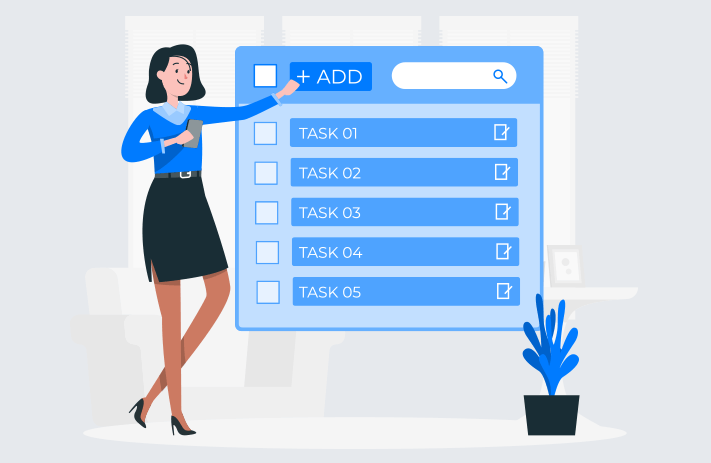
Click the button to start reading
Scrum Master vs Project Manager: 5 Major Differences, Plus Tactics for Code-Switching Between the Two Roles
Imagine this if you will. You attend a two hour work meeting, and do nothing the entire time but sit in the back and scribble into a notepad. A few hours later, you participate in the daily standup, where you observe that the team is poised to make a big, expensive mistake. But you mention nothing about it at all.
To a project manager, either of these scenarios is tantamount to being asleep on the job. But to a scrum master, this behavior is simply part of doing the job.
The role of scrum master and project manager are often conflated. And the truth is, they are similar. Each role leads a team and project to success. But the function, role and purpose of each role is so different that it’s almost like confusing a donkey with a zebra. A project manager has his or her hands in every part of a project, at each stage allocating resources and managing risk. A scrum master abdicates authority, and instead labors to empower others.
While very different, the same person oftentimes finds him or herself performing in the two roles interchangeably. During an agile transformation, for example, someone may oversee one team as the project manager and another as the scrum master. And unless you appreciate the fundamental differences between the two roles, this constant code-switching sets you up for failure.
And so just what is a scrum master versus a project manager? What is the function of each of these roles? And how do they differ from each other? This post is going to answer these questions, as well as identify a few tactics for excelling in each role simultaneously.

Project Manager Defined
To start off, let’s define the roles and responsibilities of a project manager.
The fundamental objective of the project manager is to oversee a project and lead people to deliver results. They are planners and coordinators. While project managers navigate risks and contingencies, the end goal of their projects are fairly clear and known. An event planner is a classic example of one. This position orchestrates all the components of planning and executing an event such as a concert, wedding or forum.
The Responsibilities of a Project Manager
The central responsibility of a project manager is to establish the scope, budget and timeline for a project, and then to manage the project so that it remains within these constraints. This entails doing things like overseeing risks, gaining buy-in from all stakeholders and rallying the team to meet deadlines. The daily tasks of project managers revolve around communication. They hold meetings, answer emails, coordinate efforts and create reports that bring management up to speed.
The Skills & Techniques Necessary for a Project Manager
A project manager utilizes many specific tools to assist in the role. A work breakdown structure divides high level requirements into small individual tasks. The network diagram plots each of these tasks to determine a feasible timeline. Techniques such as fast tracking and crashing distribute resources prudently. A Gantt chart, which plots all the tasks in a project along a timeline, communicates progress to stakeholders.
The Challenges & Pitfalls of Project Management
A project manager knows the ins and outs of an endeavor, and coordinates resources to execute on a project. Weak project preparation means it’s likely to exceed its budget, timeline and scope. A failure to supervise teams allows for scope creep and gold-plating.
And this briefly summarizes the role of a project manager. The position, essentially, is about executing on a clear and coherent vision.

Scrum Master Defined
Now let’s define the roles and responsibilities of the scrum master.
The scrum master is a role specific to the scrum framework, which is an agile method for managing a project with clearly defined roles, ceremonies and artifacts. Originally, scrum was designed for software development, but now it’s more broadly applied to any complex projects where there are many unknowns. The development of an application is an apropos context for scrum. While the high level requirements for the application may be clearly defined, it’s not possible to spell out from the get-go exactly what the solution or individual tasks will look like.
The scrum master helps a team to navigate complexity and arrive at creative and effective solutions to problems. The fundamental objective of the scrum master is to orchestrate the scrum process. The scrum master ensures that the ceremonies are followed, and that each person understands his or her role in the framework.
The Responsibilities of the Scrum Master
The scrum master embraces the agile principle that prioritizes customer satisfaction over following a rigid plan. He or she keeps sprints oriented around the end goal. The scrum master works with the product owner to break a project into user stories, which are individual items of work that solve a customer problem.
The scrum master in many ways is a servant leader. He or she aims to build a highly autonomous and motivated team. To this end, the scrum master gets all the necessary tools to the team, resolves conflicts and blockers, and encourages the team to take small steps and then evaluate its progress.
Finally, the scrum master listens in order to guide the team. He or she presents increment to stakeholders and captures feedback. At retrospectives, the scrum master identifies what works and suggests ways to improve work processes.
The Skills & Techniques Necessary for a Scrum Master
The role of scrum master is about cultivating and nurturing a team, and creating a strong network between the team and the organization.
Active listening is fundamental to the role. Within the team, the scrum master identifies struggles and roadblocks. The scrum master also observes the larger organization in order to understand relationships and power dynamics between all stakeholders. The purpose of this listening is to guide the team and sway stakeholders.
Teaching is also inherent to the role. The scrum master propagates the agile methodology, which accentuates empiricism, or learning through experiences. This reinforcement is particularly necessary for a team accustomed to the waterfall method. By explaining the theory behind scrum, the scrum master gradually orients a team to a new method for solving problems.
And finally, the scrum master is a coach who aims to build an independent and high-performing team. And so rather than issue edicts and provide instructions, the scrum master coaches team members and encourages them to solve problems amongst themselves.
The Challenges & Pitfalls of the Scrum Master
A scrum master, ideally, is fairly hands-off. However, the person in the role, generally, is proficient and skilled with the work at hand, and so may slip into patterns of providing a team with answers and solutions. A scrum master who’s also a seasoned project manager can slide into a command and control position, and seek to monitor and control every stage of the process.
And this briefly summarizes the role of the scrum master. It’s a leadership position, but within a very different space than a project manager.

5 Key Differences Between a Scrum Master and a Project Manager
As we’ve just seen, a description of scrum master and project manager uses very different verbiage. A project manager is described with words like deliverables, resources and risk management. While the scrum master is described using terms like agile, ceremonies, backlog and user stories. This disparity touches on some of the fundamental differences between the two roles. Let’s spell out some of these differences.
1. Known Knowns vs Unknown Unknowns
A project manager works in a context where many of the deliverables, and the process for creating them, are fairly straightforward. Take a wedding, for example. While the final outcome may vary slightly from event to event, each wedding generally includes the same deliverables: a dress and a tuxedo, a cake, a ceremony and a reception. While a project manager always needs to plan for contingencies, and not everything is exactly the same each go-around, the end goal is fairly coherent and clear from the start.
A scrum master, on the other hand, works in the complex space, on projects with many curves and bends, and with an unknown outcome. The scrum master doesn’t seek to pin down things like budget, scope and timeline, but rather seeks to navigate the complex space in such a way that it empowers the team to discover creative solutions.
2. Delegator vs Facilitator
The project manager pilots a project. He or she puts a plan into place, assigning people to workloads and coordinating resources.
The scrum master, on the other hand, facilitates the team by supplying them with the necessary tools and equipment, and removing obstructions (such as an interfering project manager!). Then they let go and allow the team to run on its own.
3. Any Context vs Agile Exclusively
The role of project manager is applicable in a variety of contexts. It’s useful within companies that stick to a more traditional waterfall management approach, and within companies who’ve “gone” agile, and use systems such as kanban, lean, scrumban and scrum in managing a project.
The scrum master, however, is a role that’s used exclusively in a scrum framework, which is a very specific project management methodology under the umbrella of agile.
4. Management Role vs People Role
Project management, as the title suggests, is a managerial position. The function of the role is to delegate, supervise and organize. It can be very detail oriented, with precise methods and formulas.
The scrum master is more of a charismatic, “people” role. The position is about persuading, inspiring and educating others.
5. Rigid vs Fluid
Fulfilling the role of project manager means following a prescribed set of formulas and guidelines. The position entails things like scope and procurement documents, risk and issues logs, Gantt charts and network diagrams.
The position of scrum master may feel a bit touchy-feely by comparison. It emphasizes things like face-to-face communication, learning through experience, and reflecting. Psychology is a huge component of the role.
And this summarizes some key differences. Now, let’s look at some tactics for switching between the two roles.

3 Tactics for Code-Switching Between Project Manager and Scrum Master
The project manager and scrum master are such different roles that ideally the same person would never perform in both simultaneously. Nevertheless, this is how things shake out from time to time, particularly in a large organization going through an agile transformation. Let’s outline three guidelines for making the switch, lest you find yourself flummoxed while changing between roles.
1. Distinguish Between the Two Roles
The first guideline is simple enough. By understanding the distinct objective, skills and duties of both the project manager and scrum master, it’s much easier to excel in both roles.
2. Hone Soft and Hard Skills
Every job requires a combination of hard and soft skills. However, a scrum master, arguably, demands a greater portion of soft skills such as listening, coaching, and persuading, while the project manager demands a greater portion of hard skills. In order to perform in both positions, it’s necessary for someone to be sharp in both hard and soft skills alike.
3. Establish Protocols and Best Practices
A job is a bit like putting on a performance. While in a given role, there’s a certain set of prescribed actions to take and lines to recite. Carefully delineating and outlining the best practices for each position makes it easy to code-switch between the two. Maybe there’s a series of questions to ask at the daily standup that gets the team talking, or a certain software that’s perfect for building a network diagram. When these procedures have been carefully documented, then slipping in and out of a role is as easy as taking off one hat and putting on another.
Conclusion
The scrum master and the project manager may seem like synonyms, while in truth they’re really homonyms. They sound alike, but the function, skills and overall objective for each of these roles is quite different.
Whether you’re a scrum master or a project manager, robust software keeps everyone on your team up to speed. Sign up for Teamly, the affordable all-in-one software that’s quickly becoming the go-to for remote teams.
















